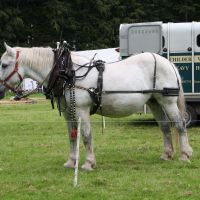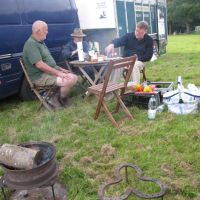Our C.W. Nicol Afan Woodland Trust has recently acquired more parcels of land to add to the 30 hectares we have long and lovingly tended up here outside Kurohime in the Nagano Prefecture hills.
Now, our first job is to assess what is there in those untended and overgrown new areas, before selectively trimming out trees to allow for new growth and to improve the woodland's overall health and biodiversity.
As far as I am concerned, the ideal way to extract the felled logs is to use horses, which do far less damage than is caused by building costly logging roads and using noisy heavy equipment.
Horses were traditionally used in Japan, Britain and many other countries for this purpose. Now there are only six remaining horse-loggers in Japan, but in Britain the number of both full-time professionals and part-timers is increasing. The quality and efficiency of the equipment being used has also improved, making the task easier for both horses and their human co-workers.
An added benefit, especially in multi-use woodlands such as ours, where there will often be visitors seeing what is going on, is that a person working with a horse is far more easily approached than someone sitting on top of a machine. So, if people know why you are cutting trees, they are less likely to make a fuss or contact the newspaper or write a snide blog or tweet or whatever it is that folk do nowadays when they want to let off steam or stab someone in the back.
This summer I was in my native Neath Port Talbot in South Wales, making a television documentary in the nearby Afan Forest Park, which is our woodland's "twin" sister. (We are the first woodlands in the world to be "twinned.")
I was already in contact with Doug Joiner, the chairman of British Horse Loggers — "an independent group of professional and part-time contractors who work horses by choice in contemporary forestry" — but at the end of filming I took time off to do some research on British horse-logging.
As luck had it, Doug was coming with one of his horses to give a demonstration just down the road in St. Fagan's Park near Cardiff. Otherwise I was prepared to go and visit him in Herefordshire, over the nearby border with England.
We initially met at a motorway rest station, where Doug, who was returning from France, needed to stretch his legs and give his horse a bit of fresh air, water and food.
I went with my friends Christian and Natsuyo Searle to make first contact and to see if Doug could find time to talk with me.
He had brought Ella, a big, gentle Percheron mare, out of her box and had tethered her outside in the car park beside a border of green, shaded by trees. While we were talking, a boy of about 3 started squealing with delight and pulling his mother toward us. "Horsey! Horsey!" he yelled, and there was nothing his mother could do to stop him.
He was a lovely little lad, with the open simplicity and wonder of a child with special needs — though his mother seemed a bit stressed, embarrassed even, as her son pulled her close to us. Doug turned and asked if the boy would like to say hello to the horse. His mother hesitated, perhaps because the horse was so huge, but Doug picked up the child and let him pat Ella's velvety nose. The look of sheer joy on that boy's face, reflected in his mother's smile, brought tears to my eyes.
It was such a simple thing, but it immediately reinforced my desire to bring horses to our Nagano woods. That's because we not only do research and work to increase the diversity and improve the health of our woods, but we also have programs for traumatized, neglected and disadvantaged children.
So it's my hope that our horses will not only haul timber, but also pull specially designed or modified carts or sleds with which to give even physically disabled children a horsedrawn woodland and mountain adventure they will never forget.
It's well known that woods are places of healing, and I have no doubt at all that a combination of woodland and working horses will be a delight to these very special people. It will make us very happy, too.
Meanwhile, from the motorway rest stop we went to St. Fagan's Park, where Doug was overnighting in his camper truck. That evening, with Ella quietly wandering around munching grass, Doug got a fire going in a specially designed camp grate and, being en route back from France, broke out some excellent wines. I had bought a couple of bottles of single malt whisky, some cheese, olives, tomatoes, cucumbers, bread and a couple of roasted chickens.
Talking to Doug was both encouraging and inspiring. He is not only a hard-working, dedicated man; he is a happy man — and thus excellent company. We discussed the possibility of bringing a British horse-logger over to Japan to find both horses and people and train them on our Afan Woodland Trust property.
But this is easier said than done. We need to build a stable with an apartment above for the horse's handler and a barn attached. We need to bring over equipment as well as a trainer. We need to acquire a pasture for the horses, and to establish sure routes and suppliers for feed. We will need a qualified veterinarian on call and, perhaps more difficult to find, a qualified farrier to look after the horse's hooves and shoes.
All this is going to take time, thought, effort — and money. But I'm sure it will be one of the best things I'll have done in my long and varied life.
The next day, Christian, Natsuyo and myself watched Doug and one of his horse-handling pupils, a lady named Kathy with long blonde tresses, working Ella in the St. Fagan's woods. It really was a joy to behold, and it was quite remarkable to see the way people easily approached with comments and questions.
When I was a boy growing up in Britain, horses were everywhere. They hauled beer, coal, milk, furniture and whatever else in the towns; they pulled carts and plows in the country. Later, as a young game warden in Ethiopia, I oversaw the 20 horses and mules we used in the Simien Mountain National Park.
I so much want to bring horses back into my life, not just as pets, or as a fad, but as working partners. This will take a lot of effort and time, but it will bring happiness and a special kind of quiet contentment. I'm sure of that.






















With your current subscription plan you can comment on stories. However, before writing your first comment, please create a display name in the Profile section of your subscriber account page.